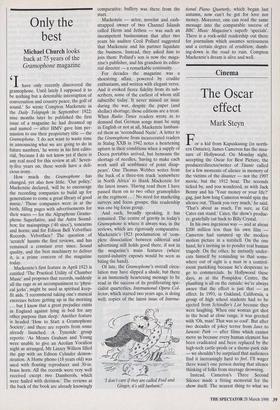Only the best
Michael Church looks back at 75 years of the Gramophone magazine
Ihave only recently discovered the gramophone. Until lately I supposed it to be nothing but a detestable interruption of conversation and country peace, the golf of sound.' So wrote Compton Mackenzie in the Daily Telegraph in September 1922: nine months later he published the first issue of a magazine he had dreamed up and named — after HMV gave him per- mission to use their proprietary title — the Gramophone. 'I do not want to waste time in announcing what we are going to do in future numbers,' he wrote in his first edito- rial, 'because I do not know yet if there is any real need for this review at all.' Seven- ty-five years on, these words have a deli- cious irony. How much the Gramophone has changed, yet also how little. 'Our policy,' Mackenzie declared, 'will be to encourage the recording companies to build up for generations to come a great library of good music.' Those companies were in at the birth, filling pages with advertisements for their wares — for the Algraphone Gramo- phone Superlative, and the Astra Sound- box; for mainsprings (`40 sizes'), tonearms and horns; and for Edison Bell Velvetface Records. Velvetface? The question of `scratch' haunts the first reviews, and has remained a constant ever since. Sound quality, and the best machinery to deliver it, is a prime concern of the magazine today. Mackenzie's first feature in April 1923 is entitled 'The Practical Utility of Chamber Music' and proposes that records, suddenly all the rage as an accompaniment to 'physi- cal jerks', might be used as spiritual keep- fit aids. 'I recommend taking one's musical exercises before getting up in the morning ... but I know that a great prejudice exists in England against lying in bed for any other purpose than sleep.' Another feature is headed 'How to Start a Gramophone Society', and there are reports from some already launched. A Tyneside group reports: 'As Messrs Graham and Young were unable to give an Aeolian Vocalion night as arranged, Mr Linzey Willcox filled the gap with an Edison Cylinder demon- stration. A Home phono (18 years old) was used with floating reproducer and 30-in. brass horn. All the records were very well received except two Damberols, which were hailed with derision.' The reviews at the back of the book are already knowingly comparative: buffery was there from the start.
Mackenzie — actor, novelist and cash- strapped owner of two Channel Islands called Herm and Jethou — was such an incompetent businessman that after two years his auditor Cecil Pollard suggested that Mackenzie and his partner liquidate the business. Instead, they asked him to join them: Pollard's son is now the maga- zine's publisher, and his grandson its edito- rial director — a remarkable continuity.
For decades the magazine was a shoestring affair, powered by erudite enthusiasm, and written with elegant verve. And it evoked fierce fidelity from its sub- scribers, some of the earliest of whom still subscribe today. It never missed an issue during the war, despite the paper (and shellac) shortage; those editions are a treat. When Radio Times readers wrote in to demand that German songs must be sung in English or not at all, Mackenzie lambast- ed them as 'secondhand Nazis'. A letter to the Gramophone from incarcerated readers in Stalag XXB in 1942 notes a heartening upturn in their conditions when a supply of Decca portables arrived, but bemoans the shortage of needles, 'having to make each work until all semblance of point disap- pears'. One Thomas Webber writes from the back of a three-ton truck 'somewhere in North Africa' to thank Mackenzie for the latest issues. 'Having read them I have passed them on to two other gramophiles in the regiment ...' No need for marketing surveys and focus groups: this readership was one big focus group.
And such, broadly speaking, it has remained. The centre of gravity in today's Gramophone is where it always was, in the reviews, which are rigorously comparative. Mackenzie's 1923 proclamation of 'com- plete dissociation' between editorial and advertising still holds good there, if not in the magazine's main features (where record-industry exposés would be seen as biting the hand).
Of late, the Gramophone's overall circu- lation may have slipped a shade, but there is an immensely heartening message to be read in the success of its proliferating spe- cialist quarterlies. International Opera Col- lector, which started two years ago, is doing well; copies of the latest issue of Interna- I don't care if they are called Fred and Ginger, it's still barbaric!' tional Piano Quarterly, which began last autunm, now can't be got for love nor money. Moreover, one can read the same message into the comparable success of BBC Music Magazine's superb 'specials'. There is a rock-solid readership out there for journalism which assumes seriousness and a certain degree of erudition; dumb- ing-down is the road to ruin. Compton Mackenzie's dream is alive and well.






















































 Previous page
Previous page